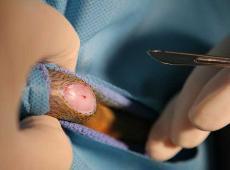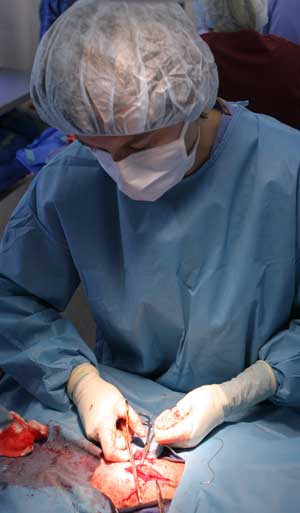Drape in the scrotal and surrounding areas.
Make an incision in front of the scrotum about a centimeter in length and pull the testicle through the incision.
Break down the fibrous attachments to the scrotum and ligate the area with suture material for hemostasis.
Make another incision between the testicle and sutures and the testicle will come out.
The spermatic cord and vessels that have been ligated will descend back into the abdomen.
The process is repeated on the other side, the incision is sewn up internally and tissue glue is applied to the top of the skin to seal the surgery.
This process, heavily simplified, is how dogs are neutered, and is one of many procedures College of Veterinary Medicine doctoral students perform as they progress toward their degrees.
The bulk of the surgeries commence in the Mobile Animal Surgical Hospital, a surgical-ready trailer, at various animal shelters and rural areas across the state.
“We go as far as Concord to the west and we go down to Southport in the east — that covers a lot of area,” Kelli Ferris, an assistant professor and director of the mobile unit, said. “Primarily we stay in central North Carolina and there are large collections of animals to work with.”
Ferris also noted that the trailer, equipped with doctoral students on a rotation, travels to areas in need of animal services.
“We work in counties where they don’t have [low-cost neuter and spay] programs in place,” she said.
The students, on average, perform about 12-15 “significant” surgeries during their two-week rotation in the mobile surgery unit, according to Ferris.
“We do an average of about 200 surgeries a month and then each student that passes through will get to do at least one heartworm treatment and see several medicine cases each day,” she said. “We probably see 30 to 50 medicine cases as well that are significant [each month].”
Meladee Farr, a graduate of Texas A&M and doctoral student in the College of Veterinary Medicine, said students in the program have the opportunity to treat a plethora of animals with different medical needs during their two-week tenure, including spaying and neutering both cats and dogs.
“We spay and neuter animals that have deposits to be adopted and treat any animals that come into the shelter that need to be looked at,” she said. “[We treat] upper respiratory infections, wounds, animals that are stray that may have been hit by a car and animals that are brought in by animal control.”
She said she enjoys being able to make a difference — particularly when it comes to saving animals’ lives and helping overpopulation.
“I really enjoy being able to perform a surgery at a low cost so when the animal is adopted we feel that they are now not contributing to the overpopulation problem,” she said. “It is a really good feeling to know that you made a difference — to know that a litter of ten puppies doesn’t have to come to shelter and get euthanized.”
Farr, along with Meghan Mackay, a visiting doctoral student from St. George’s University in the West Indies, both did their rotation and surgeries at the Wake County Animal Shelter off Highway 64 in Raleigh.
They both said they are participating in veterinary medicine because of their affection for animals.
“I didn’t know I wanted to do vet work until after undergrad. As a summer job I was an animal control officer, and it was after seeing the worst of the worst that I started getting excited about [veterinary medicine],” Mackay said. “The longer I have been going at it, the better it is — it is great — very rewarding.”
Farr indicated her father is a human doctor and she wanted to combine her love for animals with her father’s work.
“I enjoyed seeing what [my father] worked through and I enjoy being with animals,” she said.
According to Ferris, medicinal treatment and care of animals at the shelter is done at cost — no labor is charged and medicine is typically provided at the wholesale cost of the drug.
“It is a service and it is actually a service learning opportunity — something that benefits the community while allowing students to learn to do the treatments,” she said.
The trailer the surgeries and treatments are performed in is a fully functional and supplied surgical room with the ability to have three surgeries taking place at once.
“This is a 30-foot trailer and it is outfitted inside as a clinic — with anesthesia machines, surgery tables and a treatment and recovery area,” Ferris said. “The trailer has two separate sections and the surgeries are performed in rear of trailer — as many as three at any given time.”
She said Parker Overton of Overton Marine purchased the trailer for the college, including the surgery tables and anesthesia machines. The total cost was $85,000.
“They started construction on it in the fall of 1999 and it was in operation in the spring of 2000,” Ferris said. “A dolly was also purchased with donated funds to tow the trailer.”
Farr noted the trailer is also used for purposes other than helping local shelters.
“There is a bear project where dogs get hurt through the process of hunting bears,” she said. “[The vet school] actually takes the mobile unit [to the area] to do surgeries — you can take it to different places around the state and treat animals as if you were at the Vet School.”
Ferris said that the Mobile Animal Surgical Hospital has allowed the College of Veterinary Medicine to take great strides in giving its students more hands-on experience before they enter private practices or other ventures.
“When I graduated in 1996, I had done one spay on a female and I had done half of a neuter on an adult male dog and that was the extent of my surgery experience,” she said. “[The program] increases students’ operations as seniors so they get out with better skills and more confidence.”
Farr said students interested in owning an animal should check out the Wake County Animal Shelter before they consider buying a purebred dog.
“There are many animals at the Wake County Animal Shelter who need a home. Before looking into getting a purebred dog — instead of going straight to a breeder or to a pet store that sells animals — you can find an animal that is not very expensive that has already been fixed for less than you can buy a purebred dog,” she said. “Not to say there aren’t purebred animals at the shelter — I was [at the shelter] for two weeks and there were just so many really nice animals that had to be put down.”
She said the shelter has to euthanize numerous animals per day due to overcrowding and medical problems.
“The hardest part is seeing animals that have minimal medical problems that have to be put down due to the shelter’s space,” she said. “Twenty cats a day are put down for medical reasons or overpopulation.”
She also said it is tough to see cases where animals have been neglected.
Ferris encouraged students to be smart about adopting and owning an animal.
“For students out there that have pets I would strongly urge them to have them spayed and neutered if they haven’t done so already — there are low-cost options available — so money shouldn’t be an issue,” she said.
Mackay pointed to the joy animals can provide when treated and cared for appropriately and the role the College of Veterinary Medicine plays in ensuring that happiness.
“Animals are really a lot of responsibility — they can give a lot of love and happiness, but there really is a lot of responsibility in having an animal, and they do get sick,” she said. “It is our job to help them.”









